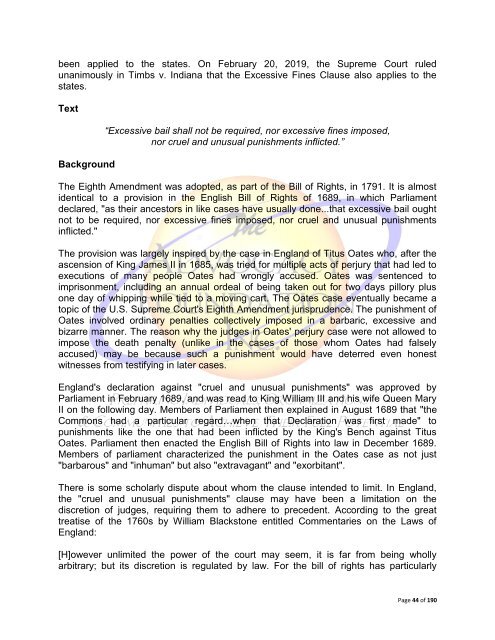The Violent Crime and Law Enforcement Act of 1994
The Violent Crime and Law Enforcement Act of 1994
The Violent Crime and Law Enforcement Act of 1994
Create successful ePaper yourself
Turn your PDF publications into a flip-book with our unique Google optimized e-Paper software.
een applied to the states. On February 20, 2019, the Supreme Court ruled<br />
unanimously in Timbs v. Indiana that the Excessive Fines Clause also applies to the<br />
states.<br />
Text<br />
Background<br />
“Excessive bail shall not be required, nor excessive fines imposed,<br />
nor cruel <strong>and</strong> unusual punishments inflicted.”<br />
<strong>The</strong> Eighth Amendment was adopted, as part <strong>of</strong> the Bill <strong>of</strong> Rights, in 1791. It is almost<br />
identical to a provision in the English Bill <strong>of</strong> Rights <strong>of</strong> 1689, in which Parliament<br />
declared, "as their ancestors in like cases have usually done...that excessive bail ought<br />
not to be required, nor excessive fines imposed, nor cruel <strong>and</strong> unusual punishments<br />
inflicted."<br />
<strong>The</strong> provision was largely inspired by the case in Engl<strong>and</strong> <strong>of</strong> Titus Oates who, after the<br />
ascension <strong>of</strong> King James II in 1685, was tried for multiple acts <strong>of</strong> perjury that had led to<br />
executions <strong>of</strong> many people Oates had wrongly accused. Oates was sentenced to<br />
imprisonment, including an annual ordeal <strong>of</strong> being taken out for two days pillory plus<br />
one day <strong>of</strong> whipping while tied to a moving cart. <strong>The</strong> Oates case eventually became a<br />
topic <strong>of</strong> the U.S. Supreme Court's Eighth Amendment jurisprudence. <strong>The</strong> punishment <strong>of</strong><br />
Oates involved ordinary penalties collectively imposed in a barbaric, excessive <strong>and</strong><br />
bizarre manner. <strong>The</strong> reason why the judges in Oates' perjury case were not allowed to<br />
impose the death penalty (unlike in the cases <strong>of</strong> those whom Oates had falsely<br />
accused) may be because such a punishment would have deterred even honest<br />
witnesses from testifying in later cases.<br />
Engl<strong>and</strong>'s declaration against "cruel <strong>and</strong> unusual punishments" was approved by<br />
Parliament in February 1689, <strong>and</strong> was read to King William III <strong>and</strong> his wife Queen Mary<br />
II on the following day. Members <strong>of</strong> Parliament then explained in August 1689 that "the<br />
Commons had a particular regard…when that Declaration was first made" to<br />
punishments like the one that had been inflicted by the King's Bench against Titus<br />
Oates. Parliament then enacted the English Bill <strong>of</strong> Rights into law in December 1689.<br />
Members <strong>of</strong> parliament characterized the punishment in the Oates case as not just<br />
"barbarous" <strong>and</strong> "inhuman" but also "extravagant" <strong>and</strong> "exorbitant".<br />
<strong>The</strong>re is some scholarly dispute about whom the clause intended to limit. In Engl<strong>and</strong>,<br />
the "cruel <strong>and</strong> unusual punishments" clause may have been a limitation on the<br />
discretion <strong>of</strong> judges, requiring them to adhere to precedent. According to the great<br />
treatise <strong>of</strong> the 1760s by William Blackstone entitled Commentaries on the <strong>Law</strong>s <strong>of</strong><br />
Engl<strong>and</strong>:<br />
[H]owever unlimited the power <strong>of</strong> the court may seem, it is far from being wholly<br />
arbitrary; but its discretion is regulated by law. For the bill <strong>of</strong> rights has particularly<br />
Page 44 <strong>of</strong> 190
















